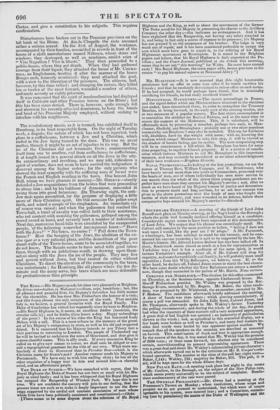The revolutionary mania, as it is termed, has exhibited itself
in Hamburg, in its least respectable form. On the night of Tuesday week, a dispute, the nature of which has not been reported, took place in a coffeehouse, between a Jew and a Christian, which ended in the Jew being turned to the door. This was no great matter, though it might be an act of injustice in its way. But the ire of the Christian did not terminate there ; communicating itself from one to another, and from coffeehouse to coffeehouse, it at length issued in a general attack on all the Jews in the city. So extraordinary and revolting, and we may add, ridiculous a spirit of warfare, does not seem to have excited the indignation it deserved among the higher orders ; for the only persons who showed the least sympathy with the suffering sons of Israel were the French and English residing in the town. One honest John Bull, whom we have pleasure in naming—Mr. GREEVE—stoutly defended aJew acquaintance from the brutes that were proceeding to abuse him ; and by his boldness of demeanour, succeeded in awing them into good behaviour. .Qt, Thursday night, the anti- Jew mob again assembled, for the purpose, of displaying a little more of their Christian spirit. On this occasion the police crept forth, and seized a couple of the ringleaders. An immediate cry of rescue was raised; and when the policemen had reached the Town-hall, a band of cavalry was called. forth to their assistance, who not content with assisting the policemen, galloped among the crowd sword in hand, and severely hurt a number of individuals. Next day, numerous hand-bills were circulated by the exasperated people, of the following, somewhat incongruous tenor—" Down with the Jews !" " No taxes, no excise !" "Pull down the Town- house !" How the hanging of the Jews, the abolition of the ex- cise (per ,se a very rational plan), and the demolition of the poor dumb walls of the Town-house, came to be associated together, we do not know. The Senate seems to have acted with good inten- tions, though with an infelicitous result, in drawing upon them- selves along with the Jews the ire of the people. They may live and govern without Jews, but they cannot do either without Christians. To direct the attention of the community to the taxes, was unfortunate ; for Hamburg, like all places where the few do- minate and the many serve, has taxes which are more defensible for productiveness than, principle.


























 Previous page
Previous page